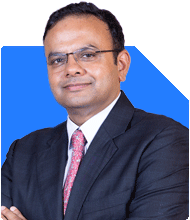Ramalingam Kalirajan |10881 Answers |Ask -Follow
Mutual Funds, Financial Planning Expert - Answered on Apr 24, 2024
He has an MBA in finance from the University of Madras and is a certified financial planner.
He is the director and chief financial planner at Holistic Investment, a Chennai-based firm that offers financial planning and wealth management advice.... more

what is the best mid cap mutual fund for long term
Mid-cap funds, often referred to as the 'middle children' of the investment universe, have the potential to offer a balance between growth and risk. They represent companies that are beyond their initial growth phase but still have ample room for expansion. However, like any growing tree, they can also be susceptible to storms and droughts in the market.
A Certified Financial Planner can play a pivotal role in helping you navigate this decision. Their expertise can guide you towards funds with a consistent performance history, competent fund managers, and a robust investment strategy tailored to long-term growth.
In the realm of investments, consistency and adaptability are virtues. A fund that has demonstrated resilience across market cycles and has the flexibility to adapt to changing market conditions can be a worthy contender for your long-term investment journey. As you sow the seed of your investment today, may it grow into a robust tree that provides shade and fruit for your future.
You may like to see similar questions and answers below
Ulhas Joshi |280 Answers |Ask -Follow
Mutual Fund Expert - Answered on Mar 06, 2023
Ulhas Joshi |280 Answers |Ask -Follow
Mutual Fund Expert - Answered on May 12, 2023
Abhishek Dev | Answer |Ask -Follow
Financial Planner - Answered on Aug 04, 2023
Ramalingam Kalirajan |10881 Answers |Ask -Follow
Mutual Funds, Financial Planning Expert - Answered on Apr 23, 2024
Mayank Chandel |2575 Answers |Ask -Follow
IIT-JEE, NEET-UG, SAT, CLAT, CA, CS Exam Expert - Answered on Dec 13, 2025
Radheshyam Zanwar |6742 Answers |Ask -Follow
MHT-CET, IIT-JEE, NEET-UG Expert - Answered on Dec 13, 2025
Mayank Chandel |2575 Answers |Ask -Follow
IIT-JEE, NEET-UG, SAT, CLAT, CA, CS Exam Expert - Answered on Dec 13, 2025
Mayank Chandel |2575 Answers |Ask -Follow
IIT-JEE, NEET-UG, SAT, CLAT, CA, CS Exam Expert - Answered on Dec 13, 2025
Kanchan Rai |646 Answers |Ask -Follow
Relationships Expert, Mind Coach - Answered on Dec 12, 2025
Ravi Mittal |677 Answers |Ask -Follow
Dating, Relationships Expert - Answered on Dec 12, 2025
Ramalingam Kalirajan |10881 Answers |Ask -Follow
Mutual Funds, Financial Planning Expert - Answered on Dec 12, 2025
Ramalingam Kalirajan |10881 Answers |Ask -Follow
Mutual Funds, Financial Planning Expert - Answered on Dec 12, 2025
Reetika Sharma |423 Answers |Ask -Follow
Financial Planner, MF and Insurance Expert - Answered on Dec 12, 2025
Reetika Sharma |423 Answers |Ask -Follow
Financial Planner, MF and Insurance Expert - Answered on Dec 12, 2025


























